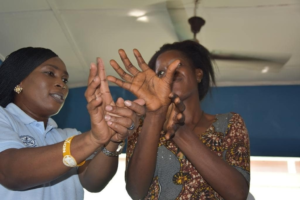Midwives are paving the way for better hand hygiene in Lagos, Nigeria
Published: May 4, 2020
COVID-19 is a reminder of the critical role of hand hygiene in preventing diseases and improving health outcomes. As the first hands to touch a newborn baby, midwives protect the lives of mothers, their children, and their communities. In Lagos, Nigeria, a team of midwives are using their expertise to pave the way for better hand hygiene, ensuring safer birth practices and healthier lives for mothers and children.
Eunice Akhigbe, Folarin Modupe Ayoola, and Sorunke Opeoluwa Deborah are all midwives for Wellbeing Foundation Africa. Each brings a unique perspective to the support and care of expecting mothers during the life changing period between conception through delivery.
The need for clean hands
Hand hygiene is a necessary practice in infection and prevention control in healthcare facilities. For expectant mothers, it is especially important to maintain a hygienic environment to prevent infection transmission and high rates of maternal and neonatal sepsis. For midwives, clean hands are a necessity to ensure safe care. Sorunke states: “Hand hygiene is sacrosanct in prevention of disease. I believe that healthy hands = healthy body.”
Globally, 2 out 5 healthcare facilities lack hand hygiene at points of care. In Nigeria, only 31% of healthcare facilities have access to a basic hand hygiene facility. “This exposes the patient to being infected and thereby extending their hospital stay. This means increased cost for both patients and the hospital,” says Folarin.
Poor hand hygiene affects both the healthcare workers and patients. Yet, prior to Wellbeing Foundation’s MamaCare360 initiative, facility staff had no consistent training on hand hygiene and other WASH practices. The lack of hand hygiene practice among healthcare staff could contribute to Nigeria’s high newborn mortality rate.
When the Wellbeing team conducted a survey within the healthcare facilities in which they worked, hand hygiene was determined as a high priority. These results reinforced the importance of WASH in Wellbeing’s programming.
Training and reminders
The midwives have worked with hospital management to ensure hand hygiene trainings were in place. Hand hygiene posters were distributed to the facilities and charge nurses were encouraged to hang posters at strategic places to ensure visibility during key moments of care. Eunice says, “We emphasized the training and retraining of staff and made sure this cascades down to the frontline health workers and even non-medical staff to improve hand hygiene in the facility.”
The Wellbeing midwives are committed to delivering hand hygiene messages not only to the facility staff, but to the mothers that they support as well. They teach pregnant and newly delivered mothers the importance of all of the essential elements for clean care to encourage safer birth practices through their MamaCare classes. These classes take place on a weekly basis, emphasizing key skills around the importance of hygiene for maternal, newborn, and child survival.
Sustaining hand hygiene in healthcare settings
Beyond their trainings, the midwives also provide the supplies needed to ensure proper hand hygiene by distributing soap and alcohol-based hand rub throughout the healthcare facilities in which they work. They also convinced hospital management to adopt hand hygiene policies that will keep staff accountable for their hand hygiene practices.
While the midwives had challenges in sustaining behavior change, including initial resistance to the program and ensuring provision of materials, their vigilance proved to be successful. A post-intervention survey was conducted revealing a 70% hand hygiene compliance rate, a sharp increase from the baseline.
Midwives leading the way as hand hygiene heroes
Because of the team’s work, the healthcare facilities now have a proper infection and prevention protocol in place. “Seeing the facilities adopt the system gives me encouragement that infections rates will reduce,” says Folarin.
By improving access and increasing training opportunities, the Wellbeing midwives paved the way for improved hand hygiene in healthcare facilities across Lagos. This provides the foundation for continuous wellbeing. Eunice adds, “There was an increase in productivity of healthcare workers because of the hand hygiene policy.” This highlights the need to address the issue at different levels to see change. According to Sorunke, “the manner of approach will determine its sustainability.”
As caregivers and healthcare professionals, midwives have the responsibility of ensuring clean hands for all. For these women, however, midwifery is not just a job, but also a way of life. Their passion is what drives them to be hand hygiene heroes because without hand hygiene, there is no clean care.
TAGS: Case Study Behavior ChangeAdvocacy & PolicyHygiene in Health FacilitiesCoronavirusRx Hand Hygiene English

